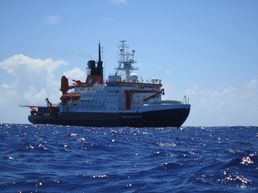
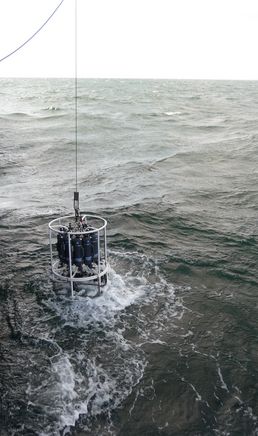
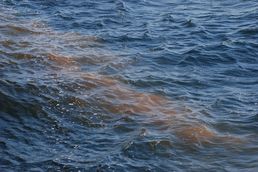
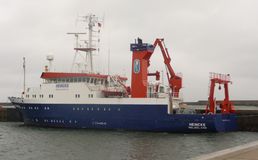
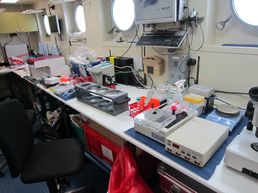
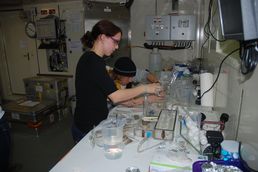
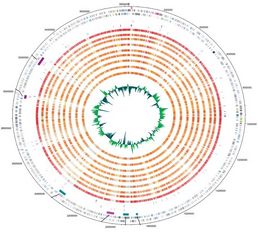
Research
Current research topics
Research Focus
The research group studies the role and ecological importance of aquatic microorganism. In particular, it focuses on the significance of aerobic, heterotrophic bacteria for the turnover and flux of matter as well as the energy flux in aquatic ecosystems such as estuaries, shallow coastal seas, shelf seas and the open ocean.
Research Questions
The research focuses on the following issues:
Which substrates can be found in the habitats to be examined? What is their origin and how are they metabolised?
How are the bacterial communities structured?
To answer the first question, we characterise the major sources of particulate and dissolved organic matter (POM, DOM) qualitatively and quantitatively. We also identify the factors determining the availability of substrates for heterotrophic bacteria. The composition of POM and DOM and the bacterial turnover of the major labile and refractory compounds are studied by using highly sensitive analytical techniques.
The research associated with the second question is an essential part of the work. We characterise the composition of bacterial communities and identify the major players involved in the turnover of POM and DOM. Culture-dependent and culture-independent biomolecular methods as well as genome and metagenome analyses are applied. A major issue of the research is to distinguish the processes and microbial communities associated with suspended matter and aggregated POM from those occurring within the open water column.
General information
Within our various fields of research, we apply modern instruments as well as traditional methods to determine individual parameters.
Studying the unknown properties of microbes, the smallest beings on this planet, is a challenging task. Within the oceans, they produce more biomass than all terrestrial species taken together. Considering that merely about one percent of all bacteria can be cultivated and are thus available for experiments, one can only get a fair idea about the organisms’ capabilities. Genes encode the bacteria’s enzymatic reactions. However, it is often not known, which reactions the bacteria utilise within their metabolic pathways. Thus, gene and genome analyses of known as well as unknown species and communities allow us to draw conclusions about the species’ composition, potential turnover of matter and activity.
This is what the basic scientific research is about: To discover and describe unknown principles and parameters as well as to verify or even falsify hypotheses.
In addition to studies carried out in the North Sea and the Wadden Sea, research cruises on large research vessels have taken or take place in the Atlantic, Pacific and Southern Ocean as well as in the Red Sea.
Several research questions and topics of the group are described below. Here you can find other projects members of the research group work on.
Roseobacter
The Roseobacter clade plays an important role in marine ecosystems. This common bacterial group consists of a multitude of different genera and therefore has very versatile properties, such as various metabolic pathways and rates, probiotic or antibiotic properties and so on. Several important strains of this clade are subject to extensive genomic analyses.
Since 2010, the research group has been conducting two projects within the Collaborative Research Centre Transregio 51, entitled “Ecology, Physiology and Molecular Biology of the Roseobacter clade: Towards a Systems Biology Understanding of a Globally Important Clade of Marine Bacteria”. This joint research project cooperates with partners in Braunschweig and Göttingen and is funded by the German Research Foundation (DFG).
- As part of one project, researchers study the ecological importance, the biogeography and physiology of the Roseobacter clade in pelagic ecosystems (A1).
- The second project deals with the ecological importance of the secondary metabolism of members of the Roseobacter clade (B2).

![[Translate to English:]](/f/5/_processed_/3/2/csm_ICBM-Logo-transparent-_91fe1c6774.png)